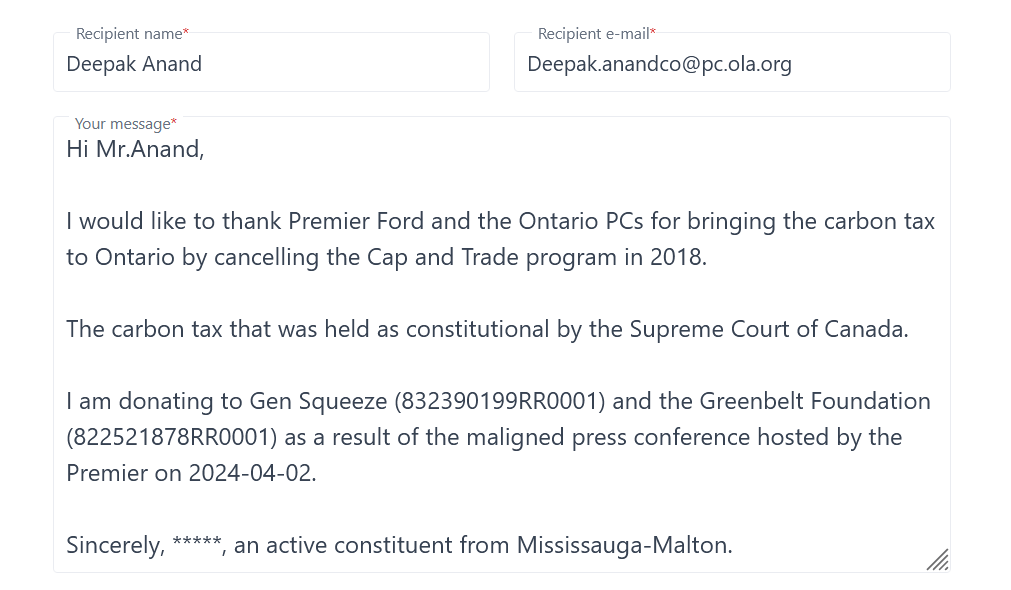- In 2005, BC held a referendum with 57.69% in favour of a PR electoral system known as Single Transferable Vote (STV). No change whatsoever occurred.
- For electoral reform, referendums aren't appropriate anyway.
- I do think BC can "cry" about the continued harms of FPP. FPP is mathematically inferior to PR, so the problem is multi factored: a) referendums are an inappropriate tool for electoral reform, b) disinformation campaigns and fearmongering have dissuaded citizens.
This wouldn't be a concern under proportional representation (PR). And let's get PR without this nonsense of a referendum.
Join the discussion over at !fairvote@lemmy.ca.
This wouldn't be a concern under proportional representation (PR). Join us over at !fairvote@lemmy.ca.
Somebody needs to just enact PR. I think with the most recent BC election, there's no reason Greens shouldn't attempt to force PR. The Greens should be aggressive and use their balance of power, otherwise they might face extinction under Duverger's law.
I've also thought it might be a good idea if parties work together, not to split the vote. So for BC, Greens could get the island (and not run candidates in the mainland), while NDP for mainland (and not run candidates on the Island). They are more alike than they are different.
I like the general strike idea, but it needs to be coordinated. We've been too conditioned to accept our broken FPP system.
I've also been thinking about PR for civil society for example with the Council of Canadians.
I'd agree with referendums, if they were widely used in other issues. Like, what would the referendum on the Greenbelt look like? What about Ontario Place? What about the sneaking privatization of our public healthcare systems? What about Doug Ford himself?
Referendums for electoral reform are really just a way for the government/establishment to look like they are fulfilling a campaign promise, without actually improving the system. It's worse than virtue signalling, cause after a (failed) referendum, it harms the PR movement. Even though it can be demonstrated that PR is mathematically superior to FPP...
And also, why do we pay our representatives in the first place? It's their job to understand the policies and issues such as proportional representation, then act in the best interests of their constituents. Obviously, ensuring every vote counts, and no group holds disproportionate power is something that improves our democratic institutions, and improving democratic institutions benefits constituents.
Anyway, that's why I keep pushing. PR proponents are holding the torch until that fateful day comes where PR is enacted.
Join the conversation at !fairvote@lemmy.ca.
The only viable long term solution is proportional representation (PR). Some electoral systems meeting this criteria:
Canada needs to stop believing that PR requires a referendum. The only people pushing a referendum are those with ulterior motives or are misinformed.
- There is no constitutional requirement. For example, in 1924 Alberta substantially changed their electoral system, adopting some PR elements.
- In 2005, BC held a referendum with 57.69% in favour of a PR electoral system known as Single Transferable Vote (STV). No change whatsoever occurred.
- The electoral system has been modified many times without a referendum. For example, per-vote subsidies were removed by Conservatives in 2011 no less, which sparked the famous prorogation of parliament.
- Referendums, no matter how clear the question is, aren't an appropriate tool. Ordinary people just don't have the time to weigh the pros and cons of various electoral systems. Citizen's assemblies would be more appropriate, as this would require comprehensive analysis by ordinary citizens.
- Why would we need a referendum to restore the fundamental rights of voters? The right to vote must necessarily include the right for the vote to have an effect. Literally millions of perfectly valid ballots are simply tossed out every single election. This would be an outrage had we not been conditioned to accept it.
The key to unlocking political parties like these is proportional representation. Some electoral systems meeting this criteria:
Nobody is disputing that the wealthy consume more than the poor.
We are disputing your claim that the wealthy do not pay their fair share of greenhouse gas emissions. Please provide evidence to substantiate your claims.
Thank you for this point. This is important to highlight in the age of carbon pricing misinformation.
Do you have evidence indicating that corporations and the wealthy do not pay their fair share of the carbon emissions they generate?

And Pharmacare, and dental care. These are just some examples of what government can deliver when we have a representative democracy, as guaranteed under PR.